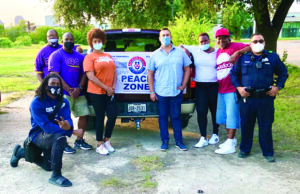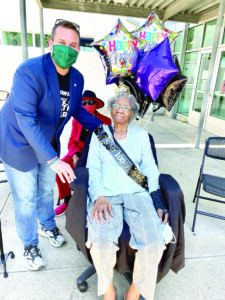By Judy Babb
Dallas City Council District 7 edges up to Mesquite, just short of Town East Mall, snugs up against downtown and includes Fair Park. Its communities are diverse — some middle class, others obviously poor. That’s where Dallas District 7 City Councilman Adam Bazaldua does his work.

Photos courtesy of Adam Bazaldua
His council assistant, Ryan Davis, called his boss amazing. “He’s dedicated to the city and his district in particular,” Davis said. “He’s tied closely to those who live in his district.”
At 35, Bazaldua is the youngest member of the council. His goals are far reaching, and his enthusiasm matches. Bazaldua shares his excitement with his community as well as with his soon-to-be 10-year-old daughter Celisse. The 5’11” Bazaldua calls the 4’4” Celisse his Mini-Me and the light of his life. She often attends town hall meetings with him.
Before he became a councilman, he and his wife of 14 years Britney were foster parents.
“We’ve put that on hold for a couple of years,” Bazaldua said of fostering. “Since I went into the council, it was too much on our plate with everything.”
Bazaldua focused on making the community better even before being elected in 2019. He was a culinary arts teacher at Skyline High School. He loved the job and took students to competitions, including two national ones. Continuing to teach was too much to do while being a councilman. A teacher’s schedule allows no flexibility.
Bazaldua has specific goals for his district. One of them is public safety. “Public safety is really multi-faceted,” he said. “It affects each neighborhood differently.” He said people refer to his district as a “tale of two cities” and that neighborhoods require different things to have safe streets. He works on community engagement.
“I have to keep open a straight line of communication for those organizations,” Bazaldua said. “They can’t feel like their work and efforts fall on deaf ears.” One way he keeps connected is through social media. Another is that his cell phone number is public. “That really keeps me busy,” he said. The town hall meetings are another important part. The people who attend see a relaxed and comfortable man in jeans, T-shirt and blazer. He projects that he is a part of the community.
Parts of his district are blighted, lacking some of the basic qualities of life. Lack of street lighting invites criminal activity. Activity can vary from drugs to prostitution to gang activity. Bazaldua is most proud of an initiative he spearheaded. “It was bringing in extra funding during budget season, specifically to bring in lighting,” he said. “It coincided with the mayor’s task force to lighten up the dark areas.” The city correlated data that showed violent crime decreased by more than 50 percent because of lighting.
With crime reduced, economic development had a chance. Bazaldua got economic dollars to encourage grocery stores to come in. Getting them in South Dallas and far East Dallas meant residents wouldn’t have to drive 10 miles to a grocery. “These are going to be game changers for contributing to for the quality of life and safety,” he said.

Bazaldua also led the fight to get sexually oriented businesses closed at 2 a.m. “A particular business in District 7 had several homicides and all happened after 2 a.m.,” he said. The council passed the ordinance unanimously. It is currently in litigation.
Bazaldua works for gentrification of his district but was quick to say that didn’t mean displacement. He wants better job opportunities, better retail, food and health care for the area. The councilman emphasized that district lines are only about elections, that the needs of the city overlap districts. The council works together. “The council is working on equity, not equality,” he said.
Looking beyond the boundaries of District 7, Bazaldua worked to increase policemen’s pay. “We wanted to make sure we provided competitive pay and addressed attrition,” he said. It took the change of police chief to turn the force around and to stop the steady flow to other police forces. “It had to be restructured to improve morale,” he said. “It was a 180 degree change when we brought Chief (Eddie) Garcia in.”
Another city-wide issue is homelessness. Bazaldua said less than 1 percent of the city budget has been devoted to helping the homeless. “I’m proud to be a part of this council because of the proactive approach we take. We have, by far, invested more money toward homelessness than in any other time,” he said. He said this council is looking at homelessness through a different lens.
“We’re going to invest in mitigating homelessness,” he said. “In the past, we invested in chain link fences, and we’ve done nothing to help our unsheltered population. The approach we’re taking now is to get serious in these conversations — addiction, mental health, and vagrancy and resistance component.
“We need to restore dignity,” he said. They do that by providing services as well as housing options. Dallas purchased hotels and provides a voucher system for housing in other areas. The city’s approximately 4,000 homeless are being looked at as people rather than numbers.
Bazaldua’s Mini-Me Celisse is following in his footsteps. On her own, Celisse created a PowerPoint to convince her principal that they needed student council at Geneva Heights Elementary. Now the school has one. “It was a really proud moment, honestly and completely driven by her unprompted,” he said.
